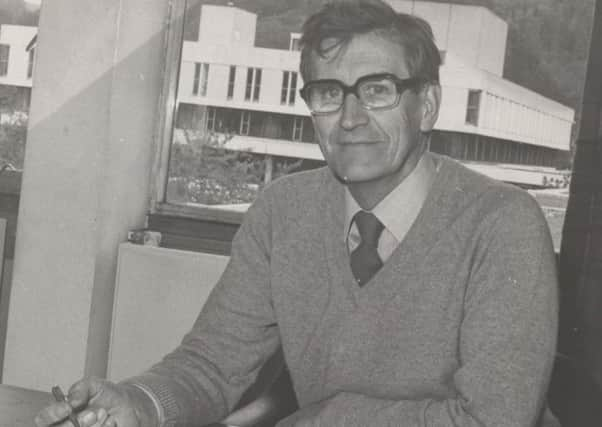Appreciation: Peter McEwen, Emeritus professor of psychology


Raised in the beautiful country parish of Fortingall, Perthshire, Peter McEwen was educated at the local village school in Fearnan, Loch Tayside, and later at Breadalbane Academy, in Aberfeldy. Academically gifted, he also showed considerable early promise as an athlete and sporting all-rounder.
However, at age 17 his life was tragically interrupted by a sequence of illnesses that confined him to bed for the best part of two years, tuberculosis irreparably destroying one of his hip joints. (Addison’s disease, a later consequence of the same infection, caused him further ill-health when he was in his thirties.)
Advertisement
Hide AdAdvertisement
Hide AdNonetheless, his infirmity did not prevent the award of an open scholarship (one of only three) to the University of Edinburgh, where he spent his first two years studying for medicine, before going on to gain a first-class honours degree in psychology.
Although he was unfit for military service, given the onset of war, Peter worked during one summer for the Ministry of Agriculture.
With many students and others volunteering for work on the land, it became clear that their efforts were being less effective than hoped for by the farming community.
This prompted Peter to suggest the setting up of organised work camps where the volunteers could live and work together. When the resultant scheme proved to be a notable success, Peter went on to manage one such camp, in Berwickshire.
Having met as students, Peter married young Janet (Jenny) Vass in 1946 and they travelled to South Africa, where he took up a junior lectureship in Pietermaritzburg.
Returning to Edinburgh in 1948, Peter spent time working with Dr Richard Scott (later to become the first ever professor of general practice), sharing an interest in the formal training of general practitioners in the newly formed NHS.
In 1949, the couple moved to Belfast, Peter joining the Psychology Department of Queen’s University as a lecturer, under Dr George Seth.
Following the birth of their second child, Peter began working towards a PhD in the field of visual perception, the topic being “Figural After-effects”. A monograph was published in 1958 by the British Psychological Society and several related papers were to follow.
Advertisement
Hide AdAdvertisement
Hide AdPeter was promoted to senior lecturer in psychology, and was active within the Special Care Committee of the Eastern Health Board (dealing with services for the intellectually disabled). Concern about the relative absence of social workers in Northern Ireland led him to assist in establishing and delivering a programme of training aimed to remedy this.
In addition, he enjoyed a spell as chairman of the University’s Foreign Student Relations Committee.
In 1962, interest in Peter’s PhD thesis resulted in him accepting a visiting professorship in Ohio, at the liberal and progressive Oberlin College. Thus, the family decamped to the United States for 18 months.
The birth of their fourth child did not deter Peter and Jenny from also taking this exciting opportunity to explore a new country. However, with the Cold War at its height, the Cuban Missile Crisis and the increasing American involvement in Indo-China, it is perhaps unsurprising that Peter also became involved with the Peace Corps.
Peter returned to Belfast in 1963, the same year in which the influential Robbins Report (Committee on Higher Education) was published. The report recommended the establishment of a minimum of six new universities and 1964 brought the announcement of Scotland’s first new university for 300 years, to be built at Stirling. Dr Peter McEwen was appointed to the new chair of psychology in 1966.
It was thanks in no small measure to the work of Peter and other early appointees that when the University of Stirling opened its doors for the first time in September 1967 there was a viable infrastructure to welcome the first undergraduate and postgraduate students.
Within what is now a thriving campus, the Psychology Department’s original complement of five has grown to seventy, including nine professors, and around 30 postgraduate research students.
Until his retirement in 1984 – at which point he was appointed Emeritus Professor – Peter was heavily involved not only with running his own department, but also in the broader development and management of the university.
Advertisement
Hide AdAdvertisement
Hide AdHe served on the Academic Council (equivalent of the Senate), was first chairman of the Discipline Committee and, for a period, accepted the role of acting vice-principal.
He was highly regarded, and always seen as being approachable, friendly, conscientious, well-informed, and fair.
Given to relying on rigorous analysis, he was reluctant to express an opinion before hearing the full story and would insist on exploring all viewpoints relevant to any dispute or discussion.
Outside of university life and into retirement, Peter was involved for many years with Forth Valley Health Board and, in particular, with the Mental Health Planning Committee. He was also a school governor of Dollar Academy.
Although his health continued to cause periodic concern, time and again he recovered to reclaim his ever-optimistic zest for life. He was always a prodigious reader, showing interest in and being genuinely knowledgeable about a great many, and varied, topics.
He was a true polymath, whose intellect faded little with age. When, eventually, he became greatly restricted in mobility, it is no exaggeration to suggest that his beloved books remained his window on the world.
Steadfastly modest about his own capabilities and achievements and driven by a deep and fundamental sense of morality, Peter’s concern was always for the other person, be it student, professional colleague, friend or member of his own family.
Fairness, integrity and generosity were embedded in his character.
Advertisement
Hide AdAdvertisement
Hide AdAlthough family and friends are greatly saddened by his passing, his delight in knowledge and his many virtues live on, expressed in innumerable ways in the lives of those who were close to him.
Peter is survived by his wife, Jenny, their four children, five grandchildren and four great-grandchildren.